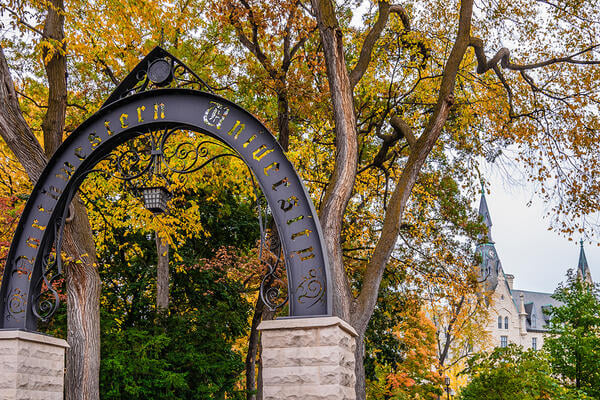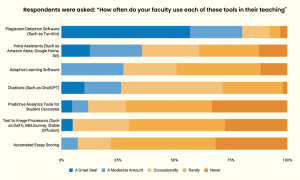A triennial convening of women historians set for next year won’t occur. The two co-presidents of the organization that puts on the event are no longer in their positions. And the group isn’t providing many details on what happened to what it calls “the largest women’s history event in the world.”
A week ago, prospective attendees of the 2026 Berkshire Conference on the History of Women, Genders and Sexualities—often just called “Big Berks”—received an email announcing the cancellation of what would’ve been the 20th gathering since Big Berks began in 1973. The Board of Trustees told them that, “as a result of increased political pressure on academic institutions, it has become clear to the Officers and Trustees that we will not be able to find a university willing to host our triennial gathering in time.”
Some scholars took to social media—sharing that message, decrying current U.S. politics and criticizing Northwestern University, which the Berkshire Conference had earlier announced as the host. It was seen as another example of the escalating attacks on gender and sexuality studies and scholarly inclusion more broadly. It was also another instance of academics denouncing higher education institutions’ complicity in suppressing diversity efforts and academic freedom.
“The cancellation of Big Berks bc unis are too intimidated to host this venerable institution in Women’s history is … well, I don’t have words for it,” one musicologist posted on Bluesky. “In just a few months the administration has broken academia in ways that I’m not sure we’ll ever recover from.”
But then more information emerged. It turned out Northwestern never formally agreed to host the conference, which organizers have said attracts up to 2,000 attendees, and the conference’s leadership has been upended.
‘Communication Issues’
On March 18, the day after the conference cancellation was announced, Amy Stanley, a gender historian who directs Northwestern’s Nicholas D. Chabraja Center for Historical Studies, posted on social media, “If I thought for a minute that our administration had cancelled this conference for political reasons I would be complaining, loudly. But this is not an accurate representation of what happened.”
Stanley wrote on Bluesky that “Northwestern never agreed to hold the conference,” and though “we did have a conversation very early this year about the possibility of hosting it,” there were “a number of logistical and administrative—not political!—concerns that made it untenable.”
Her posts “totally interrupted the outrage … which almost never happens on social media,” said Claire Potter, a professor emeritus of historical studies at the New School for Social Research.
In a statement to Inside Higher Ed, Northwestern’s media relations arm likewise said, “Although there were discussions about the possibility of Northwestern hosting,” the university never agreed.
“We clarified our position with organizers earlier this year. Our decision was based solely on logistical and administrative concerns and had nothing to do with the topics to be addressed at the conference,” that statement said. Another university statement said, “Institutional and administrative support to host the conference successfully were lacking.”
The university didn’t provide further comment to Inside Higher Ed.
The Berkshire Conference of Women Historians, the nonprofit that puts on Big Berks, had previously announced Northwestern as the June 2026 conference site in a call for possible presenters to submit papers. It’s unclear when that call went out, but it said submissions would start being accepted in mid-September of 2024—suggesting that the announcement was made at least last fall.
Adding to confusion about how this happened is the fact that one of the Berkshire Conference’s leaders was on the faculty at Northwestern. Ji-Yeon Yuh, a Northwestern associate professor, was one of the organization’s co-presidents. But not anymore.
The original March 17 email from the Berkshire Conference board referenced a leadership shakeup but didn’t specify what had occurred. The board said in a longer statement March 18—sent after the social media posts—that the conference “made the difficult decision to part ways with the current co-presidents.”
“This decision was not taken lightly and reflected ongoing communication issues that the Board of Trustees had repeatedly tried to address,” the board wrote.
Neither Yuh nor the other co-president—Rhonda Y. Williams, a Wayne State University professor—responded to Inside Higher Ed’s requests for comment.
Amrita Chakrabarti Myers, the Ruth N. Halls Professor of History at Indiana University at Bloomington, posted on Facebook March 18 that the co-presidents—who, she noted, were women of color—were progressing toward securing an alternate venue when they were ousted without warning. In fact, the co-presidents learned of the decision when they were locked out of their Berkshire Conference email account and asked why, Myers wrote. The former account for the presidents no longer accepts emails.
None of the other Berkshire Conference officers or Board of Trustees members granted interviews. The trustees’ email address sent Inside Higher Ed a statement it said was from the officers and trustees.
“Our announcement of the cancellation of the Big Berks was never intended to be a condemnation of Northwestern University,” it said. “Instead, we wanted to speak to the current political climate wherein hosting a conference on feminist, queer and trans history has become extremely risky.”
The March 18 email from the board to members acknowledged that “Northwestern’s initial expressions of support for hosting the Big Berks in 2026 did not culminate in a formal agreement.” And the board listed additional reasons for canceling the conference that didn’t have to do with the political climate.
Moving Forward
The conference’s leaders didn’t respond to Inside Higher Ed’s written questions—including how many other higher education institutions they checked with before concluding that finding another willing university host in time was impossible. And the board’s March 18 email to members raised access concerns regarding possible venues outside of universities.
“Moving to a hotel would likely increase costs, making the conference inaccessible to many,” the board wrote. And relocating outside the U.S. would make it less accessible to scholars here, the board said.
“Moreover, the response to the call for papers was remarkably low, suggesting that the uncertainty of the present moment might require a rethinking of how we organize,” the email said. “Traditionally, the presidency was linked to hosting the Big Berks at one’s institution. Do we need to rethink this structure in this current political environment?”
The board urged members to attend its upcoming annual meeting, called “Little Berks,” to discuss the organization’s future. It’s from May 29 to June 1 in Evanston, Ill., and the organization says there will be a virtual attendance option.
Potter, who was involved with the organization for years and followed the evolving story online, said putting on such a conference requires a tremendous amount of work. Over the decades, Big Berks “grew and grew and grew, and it continued to be run by a very small group of people,” all volunteers, Potter said.
“The Berkshire Conference has grown exponentially over time,” she said, “and it has grown without regard to what kinds of personnel and resources it has to run it.”







